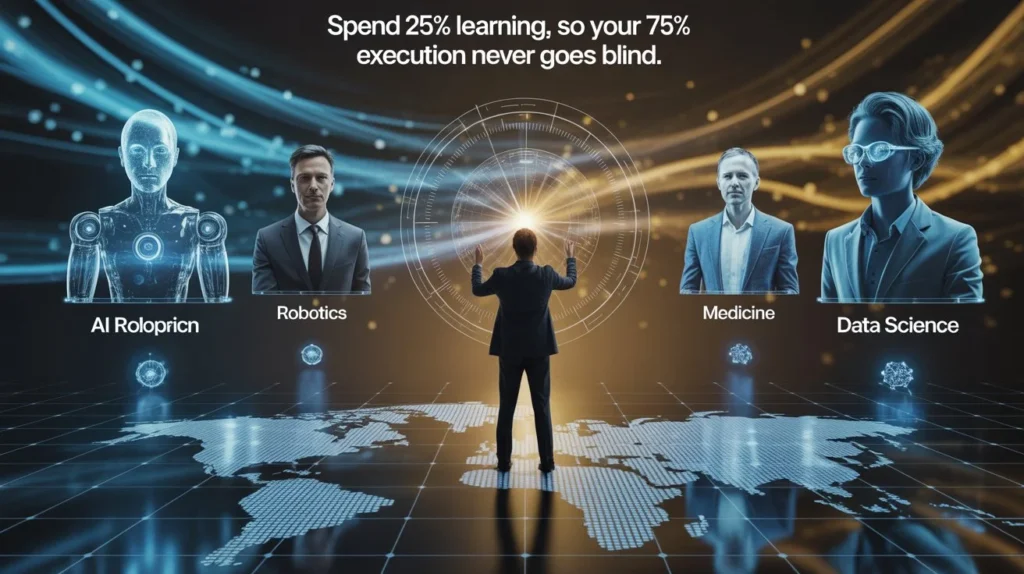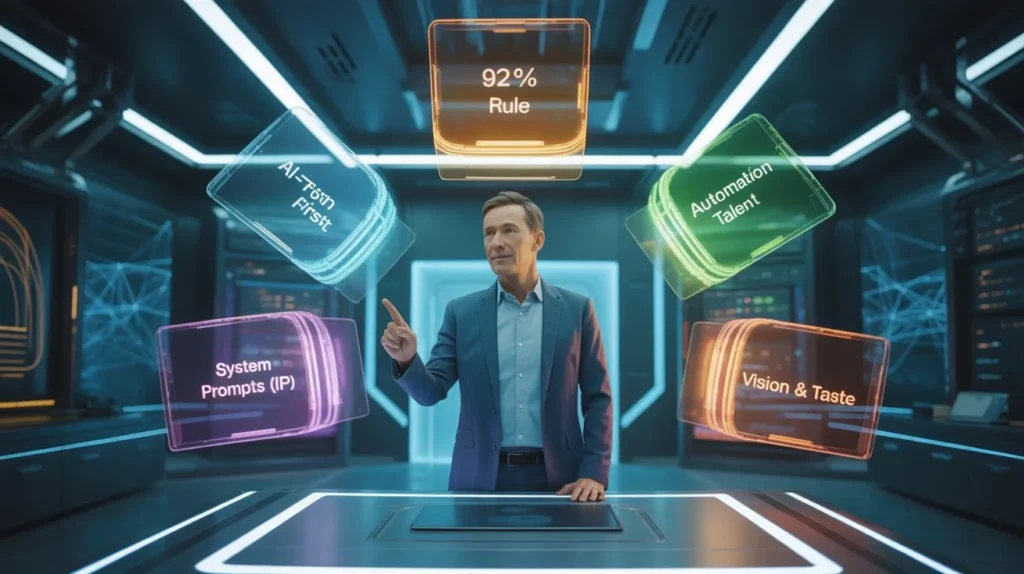The world of business, as we know it, is over.
That might sound like hyperbole, but if you’re an entrepreneur, a founder, or just someone looking for sustainable online business ideas in the current landscape, this is the stark reality you must face and the agent driving this chaos, opportunity, and disruption is Artificial Intelligence.
In the span of just 32 months, ChatGPT has exploded onto the scene, garnering over 700 million weekly users. It represents the single fastest technological adoption in history, surpassing even Facebook. This isn’t just a new app; it’s a fundamental shift, best summarized by the old quote: “Everything that’s electrified will be cognified.”
We are moving past the early stages of the internet, past social media, and into the era of instantaneous, PhD-level intelligence available to everyone. The challenge? Most people are applying a linear thought process to this exponential technology. This massive gap between perception and reality is where the greatest danger—and the greatest opportunity—lies.
The Most Dangerous Thing in the World Isn’t AI—It’s Being Average
The common thread running through all discussions about the future of work is a looming sense of fear. Why? Because AI doesn’t just automate simple tasks; it can perform complex, high-skill work.
- Code Generation: AI can write code better than a junior programmer. This immediately wipes out the entry-level technical role—the traditional stepping stone for an entire career path.
- Knowledge Synthesis: AI has the world’s information distilled from every genius in every domain, capable of giving a comprehensive answer in 14 seconds. No individual human can compete with that level of speed and synthesis.
The worst thing you could possibly do today is start a business model that is destined to be disrupted in six months. This is why the danger isn’t the robot; it’s being average in a world that is changing fast.
When you’re competing against AI, which constantly gets better the more it is used, “average” no longer means “adequate.” It means “obsolete.”
The Home Builder Wake-Up Call
The skepticism many people harbor is a massive blind spot. Consider the 48-year-old home builder who believes, “That AI thing is not for me.” He was still writing property listings manually.
Here is the truth: he doesn’t get to make that call.
When you have a competitor—a person starting today with one property—who is utilizing a free tool like ChatGPT to generate, optimize, and synthesize property listings with PhD-level intelligence, the 20-year veteran cannot intellectually compete.
If you are waiting for someone to solve this problem for you, nobody is coming to save you. This is a reality for everyone, from traditional real estate agents to copywriters and graphic designers. The massive, life-changing opportunity is available, but it requires a painful process of disruption, just like the internet decimated the newspaper industry.

🛠️ From Doer to Director: The Only Profitable AI-First Online Business Ideas
To make a million dollars or more in this new AI-driven landscape, you must make a radical and immediate shift in your mental model.
The defining transformation of the last two years is the move from the Doer to the Director.
Prior to AI, most of the doing (the execution, the grunt work, the labor) was done by the individuals on your team—interns, assistants, entry-level staff. The manager or founder was the Director (the creative, the strategist).
Today, that relationship is inverted.
The doing—the execution of coding, drafting legal letters, or compiling research—is now a function best delegated to AI.
The Elon Musk Principle
If you listen to the most successful innovators, they talk about this shift constantly. Elon Musk says building the prototype is easy; building the factory (the system that runs the prototype) is an order of magnitude harder. In the world of online business ideas, this principle applies directly: your goal isn’t to do all the execution yourself, but to design the systems and AI processes that allow your ideas to scale efficiently and sustainably.
In the AI economy, your goal is no longer to be the Doer who builds the website or runs the ad campaigns. Your goal is to build the machine that runs the machine.
To build a million-dollar company today, you must start with the premise: “I am not going to be doing the thing I sell.”
Your job is to design and direct the AI agents that fulfill the service. This is the only way to build a company that is competitive long-term and not one that will be wiped out in six months by the next major language model update. For entrepreneurs, mastering AI systems in this way is the key to creating scalable and sustainable online business ideas.
The Death of the Middleman and The Power of the Prompt
This shift fundamentally changes what constitutes valuable labor and what creates truly defensible online business ideas.
The Middleman is Done
The role of the middleman—the person whose job is to collect, process, and route information—is already obsolete.
- A mortgage broker or a traditional real estate agent who simply routes information between a buyer, seller, and lender cannot compete with an AI that can process perfect, comprehensive information 24 hours a day, faster and more detailed.
- The lawyer who charges $5,000 for a simple patent troll response is being replaced by an automated system using ChatGPT to generate a case-law referenced response in seconds.
The moment an AI can do something with perfect information, the human involved in the transaction for routing purposes is no longer needed. Your value must shift to creation, strategy, and direction, not delegation or execution.

Your New Intellectual Property (IP)
If you are moving away from the doing and into the directing, what is the asset you are creating?
It is your System Prompts.
Entrepreneurs used to build value by creating complex Standard Operating Procedures (SOPs) and proprietary software. Now, your new intellectual property is your AI Prompts.
These are the sophisticated, detailed instructions that capture your experience, your strategy, and your unique process, which you then feed into the AI to execute on your behalf. These prompts—which represent years of human expertise—are the blueprints for your million-dollar machine and the foundation for scalable online business ideas.
AI is the New Programming Language
For the first time in history, the programming language of the most powerful tool on the planet is English.
This means that every single person on Earth who knows how to type or speak now knows how to program. Every interaction with ChatGPT is a line of code.
This democratization of capability makes studying prompt engineering incredibly valuable. Being the person who knows how to speak, talk, and direct the AI is the only long-term competitive advantage you have, even if future models like GPT-6 launch built-in automations that disrupt your current business.

🛑 Build the Habit: The First Step to Implementing AI
The biggest barrier to success is not the technology; it is the human ego and the failure to build the correct habit.
The most crucial step you can take today is to make AI your default first response.
If you have a question, an idea, a thought, or a problem, you must go to the AI first—not second, not after a conversation, but first.
To think that you are smarter than the world’s distilled information is simply arrogance. You must build the habit of treating AI as your Chief of Staff, your most brilliant personal assistant.
The simplest entry point? Start using AI to organize your tasks and goals. Make it a daily habit. If you think you use AI often, ask yourself:
- Show me your Custom GPTs.
- Show me your Master Prompts.
- Show me your System Prompts (Your new IP).
If you don’t have these, you are not truly leveraging the tool.
Focus Your Mind: The 25/75 Rule
How does a CEO stay ahead without becoming distracted?
- 75% Execution: Focus on executing what you can control today in your current business.
- 25% Learning: Dedicate 20-25% of your time talking, interacting, learning, and monitoring the AI landscape.
You can even weaponize your social media feed by purposefully searching, watching, and tagging content related to “AI” and your industry (e.g., “AI real estate”). By spending a focused two hours a day consuming trusted, high-value AI content, you keep your mind updated on the exponential change and discover new insights for your online business ideas without being distracted by low-value tasks.
🔑 The Four Master Skills of Leverage
The book Buy Back Your Time focuses on delegation, collaboration, and building systems. With the advent of AI, that philosophy is now called Buy Back Your Time with AI.
To create massive leverage in the modern era, there are four master skills:
- Capital: Using money to acquire assets (e.g., owning a home).
- Content: Creating one piece of media or a single Standard Operating Procedure (SOP) that can be distributed to a million people with no additional effort (e.g., this blog post).
- Collaboration: Labor arbitrage—hiring people to maximize your time.
- Code (AI): This is the modern shift. When you invested in traditional software, you got best practices baked in (e.g., a CRM forces you to do lead scoring). Today, by investing your time in building sophisticated AI agents (your new code), you bake best practices into the core fulfillment of your online business ideas.
The entrepreneurial journey hasn’t changed in one fundamental way: you must pick a growing market. Because if you suck, you’ll be good. But if you’re good, you’ll be great—simply because the market is pulling you along. The change is in the how: you must pivot to an AI-First model.
I used to be a marketing agency. Now I am an AI-First marketing agency.

Leveraging the Fourth Master Skill: AI as the New Code
In Part 1, we introduced the four master skills for creating massive leverage: Capital, Content, Collaboration, and Code. Today, Code is AI.
This new form of “code” is wild because it spans and amplifies the other three master skills. This is not just theoretical; this is about immediate, quantifiable advantage in your professional life.
The Investor’s Edge: AI-Powered Capital Analysis
If you are not using AI to analyze your financials—personal or professional—you are leaving money on the table. The ability to trade time for tools has always been the marker of progress: Human + Tool beats Human. Just as a calculator allows us to build buildings despite the complexity of calculus, AI allows us to process financial complexity instantly, giving entrepreneurs the edge to optimize and scale their online business ideas effectively.
Example: The Board Meeting Cheat Code
Imagine an investor receiving a massive board deck moments before a critical meeting. Instead of rushing to skim 67 pages, that investor can load the entire financial report into a private AI model and ask:
“As an investor, what are the five questions I should be asking right now regarding the compression of the gross margin in relation to the CAC payback period of the Facebook ads?”
The AI delivers penetrating, page-specific, deep questions that make the investor look like a strategic genius. This is the new edge. This is how you generate better capital returns and uncover highly profitable online business ideas—by utilizing instantaneous, exhaustive analysis.
The Human Element: Why Opportunity Still Exists
The idea of a post-scarcity world, where the costs of transportation, food, and shelter diminish significantly, is rapidly approaching. Companies like Figure are deploying AI robotics that “sell work” that nobody wants: the Dirty, Dull, and Dangerous (the 3 Ds). These robots are already processing packages at UPS and handling dangerous parts at BMW.
This progress begs the profound question: “Who are we if robots are doing everything?”
The Insecurity Arbitrage
As long as a human is still interfacing with the technology, opportunity remains because humans bring their feelings, fears, insecurities, and shortcomings to the equation.
When an assistant processes an inbox, they do so with zero emotion. They don’t have the history or the baggage that prevents a founder from replying to a sensitive email. This “neural transformation”—moving the emotional friction away from the execution—creates a massive space for specialized online business ideas built on:
- Emotional Intelligence (EQ) as a Service: Businesses focused on the empathetic, strategic delivery of the AI-generated solution.
- Human Alignment: Coaching and consulting services that help individuals and businesses align their purpose with the reality of a world where work no longer defines existence.
- The Great Confrontation: Many people are not ready to confront the core question: What do I do if I’m not chasing something? The noise of the old system has allowed us to avoid this internal work.
If people are going to struggle when mundane tasks are solved, they need to turn inward. We must create the necessary space (silence, meditation) to separate ourselves from our thoughts. This self-realization journey is the next frontier for human endeavor and, ironically, the source of truly unique, value-driven online business ideas.
92%: The New Measure of Efficiency for Online Business Ideas
To thrive in this new landscape, every role must pivot. This is not just a suggestion; it’s a mandate.
One clear directive being implemented across high-growth companies is the 92% Rule:
92% of all work must be done by AI. The remaining 8% is you.
Why 92%?
The 8% is the magic. It’s the human fingerprint, the art, the taste, the unique emotional intelligence, and the final editorial vision.
The moment you accept that 92% of your research, drafting, synthesis, and execution can—and should—be automated, your value shifts entirely from Author to Editor.

The Problem of Pretending Not to Know
When teams try to implement AI, they often report that the output is only “30% good.” This is often a function of pretending not to know how powerful AI truly is.
Are you pretending not to know that AI can do your job because the realization would hurt your feelings?
If you are still executing tasks that AI can solve, the problem is not the task; the problem is the why behind your unwillingness to leverage the tool. This unwillingness is where you must do the self-development work.
The System Prompt Cheat Code: Your New IP
If your AI output is poor, you are still playing “prompt engineering” on the kindergarten level. The secret lies in the System Prompt.
A system prompt is a hidden layer of instruction that tells the AI its role, its context, its tone, and its required output format before the user input is processed. Think of it as a complete blueprint for an application.
How to get to 92%:
- Stop Asking for Simple Answers: Start structuring highly detailed, multi-step instructions that leverage the AI’s full context window.
- Use the Reverse-Engineering Hack: Once you get an output you love (say, a perfect piece of marketing copy), ask the AI: “Write me the system prompt that would have generated this output.” This unlocks the blueprint of professional-grade execution.
- Create Custom Agents: Develop specific Custom GPTs or agents designed for a single function (e.g., a “Book Architect” that drafts a full book outline, quotes, and structure based on a topic and personality).
These refined, high-level system prompts are not just useful tools—they are your new intellectual property. The value of your online business ideas will soon be measured by the sophistication and effectiveness of the AI agents you design.
Vision, Taste, and Creativity: The Human Future
The role of the director, the entrepreneur, and the team member is not eliminated; it is elevated.
The human role is centered on:
- Vision: Knowing what the future should look like, even if it doesn’t exist yet. This is about identifying market needs and developing the revolutionary online business ideas.
- Taste: Being the final arbiter and editor. The AI can generate millions of marketing headlines, but the human must have the taste to select the one that transmits the perfect emotion.
- Co-Creation: Working with a powerful tool, not against it. This is the difference between being the sole Author (which is slow) and being the Editor of AI-generated complexity (which is fast).
Just like a modern music producer uses software and hardware to handle the technical aspects (the 92%) but brings the ultimate vision, taste, and emotional intelligence (the 8%), the successful founder must focus only on the art. Stop coding, stop writing first drafts, and start directing the machine.
The Human Mandate: Taste, Connection, and Community
We established that the 8% remaining in the 92% Rule is the human magic—the taste, vision, and creativity. But the human element extends beyond just the final edit; it involves a massive shift in how we spend our time.
The Value of the 8%: Taste and Emotion
AI can generate 25 Facebook ads, but it is the human director who must look at those 25 and intuitively select the two that are most likely to convert. Taste and judgment are irreplaceable.
Furthermore, any part of a business that requires genuine human-to-human interaction or emotional connection is now hyper-valued.
- Community: AI’s efficiency gives us back 20 hours a week. Instead of scrambling to fill that time with low-value work, the future is about prioritizing community and in-person connectivity. People are not craving more work; they are craving better experiences. The best online business ideas will create the financial freedom that allows founders and employees to dedicate time to this crucial human connection.
Building the AI Habit: Stack, Default, and Learn
If you want to create a successful, AI-first business, it’s not about the number of hours you spend; it’s about rewiring your brain.
Habit Stacking: Default to AI
The key is Habit Stacking: Find something you already do daily and tag the AI interaction onto it.
For instance, if you sit in the same chair every morning for meditation and reading, that is where you introduce the habit of prompting. You must program your mind to default to AI when a question, idea, or problem arises—not Google, not a colleague, but the tool.
Make it easy: set up the hotkey, use the voice feature, and make the interaction as fast as asking a friend. The clunky feeling will disappear as the habit solidifies.

The 25% Learning Commitment
While execution is 75%, a critical 25% of your time should be spent on learning about AI and disruption in your world.
This learning isn’t passive; it’s proactive and strategic:
- Find the 10x Experts: Acknowledge that you may not be the one who can figure out the complex math of the next language model. Your genius lies in finding the smartest people and bringing them into your life.
- Strategic Networking: Leverage social media to identify genuine experts (the 10x engineers, the AI founders, the PhDs) in various domains (robotics, medicine, data centers). Schedule quick AI Expert Roundtables—short calls designed solely for them to teach you.
- Calibrate the Timeline: When asking experts about a new technology, always ask for the timeline. Is the claim relevant today, in six months, or in two years? This allows you to prioritize and calibrate your business strategy.
The AI-First Mandate: Example
When a sign company owner asks how AI applies to his business, the answer is: “How do you become an AI-First Sign Company?”
The AI can immediately reveal two critical insights:
- Opportunity: The continued desire for in-person gatherings will keep demand for signage high.
- Threat: If the owner doesn’t leverage robotics to build the signs, his competitor who does will have a better cost structure, eventually disrupting his business.
The goal isn’t just to use AI; it’s to have the necessary information—filtered by experts—to strategically think about your market’s disruption.

✅ Final Strategy for AI-First Online Business Ideas
To summarize the strategy for building competitive and sustainable online business ideas in the age of AI, you must make these non-negotiable pivots:
- Pivot to AI-First: Your business is no longer what it was; it is now an AI-First [Your Industry] business.
- Adopt the 92% Rule: Mandate that 92% of all execution must be delegated to AI.
- Default to AI: Build the habit (Habit Stacking) of making AI your first resource for problem-solving.
- Invest in Your IP: Your intellectual property is now your sophisticated System Prompts and the custom AI Agents you design.
- Hire Automation Talent: You need a full-time AI Automation Specialist to manage workflows and train your team.
- Focus on the 8%: Dedicate your time to Vision, Taste, and Community.
The future of business is about creating the financial and temporal freedom to be your best, most purpose-driven self. The AI is the tool that makes the ultimate dream of no small plans possible.




